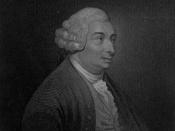David Hume provided one of the most compelling arguments to debunk the notion of miraculous events which are so dear to the heart of Christians in particular. Throughout this paper, I will argue that belief in miracles is justified. In order to make this argument, I will first examine HumeÃÂs view that belief in miracles is not warranted. Then I will consider an opposing view that belief in miracles is justifiable through GodÃÂs constant activity in the world around us. Finally, I will contradict HumeÃÂs view by arguing he gives a false definition of a miracle and if we do assume HumeÃÂs view, no new facts could ever be proven.
Hume understands a miracle as being a specific act by God that breaks a law of nature which has been created by God. He argues that we should not believe miracles ever happen. They could, but it is always more reasonable or wise to believe of any particular alleged miracle that it did not happen.
He suggests it is more probable that someone has made a mistake or has lied.
Hume goes on to explain himself by saying, "A wise man proportions his belief to the evidence" (p. 116). The main evidence we have for any belief is our own experience, but we must be skeptical about this since it might not represent the whole truth. When we base our beliefs on other people's testimony about their experiences, we should be even more skeptical as one must keep in mind that not all witnesses are reliable.
Hume considers the case when there is disagreement in our experience of the testimony presented to us. In this case, we should weigh the different sides against each other. The case of the laws of nature having no exceptions is backed by...


